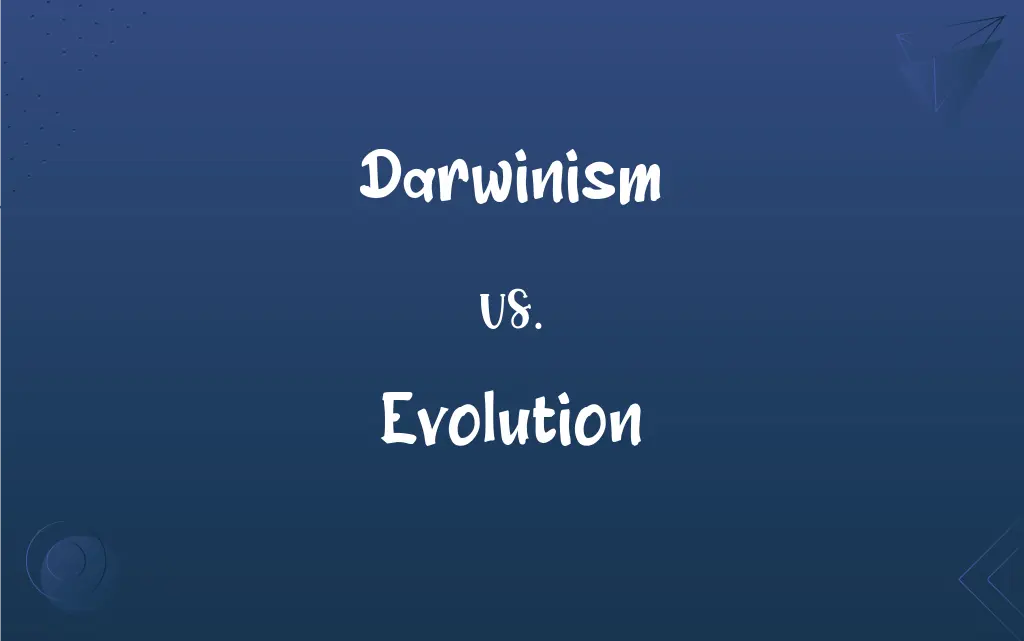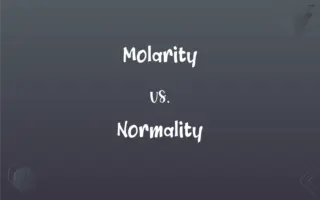Darwinism vs. Evolution: What's the Difference?
Edited by Aimie Carlson || By Harlon Moss || Updated on October 27, 2023
Darwinism refers to the theory of natural selection proposed by Charles Darwin, while evolution is the process by which species change over time.

Key Differences
Darwinism and evolution are terms that, while related, describe different concepts within biology. Darwinism is a theory introduced by Charles Darwin that explains the mechanism of evolution through natural selection. On the other hand, evolution is a broader concept, referring to the gradual change in the inherited characteristics of species over successive generations.
While evolution encompasses the idea that species evolve over time, Darwinism provides an explanation for how this process occurs. Specifically, Darwinism posits that organisms with advantageous traits are more likely to survive and reproduce, passing on these traits to their offspring.
Evolution, as a term, doesn't confine itself to any single mechanism or theory. It simply refers to the observed changes in species over time, whether that be due to natural selection, genetic drift, or any other evolutionary force. Darwinism, however, is a specific subset of evolutionary theories, focusing on the role of natural selection as the primary driver of these changes.
One can think of evolution as the overarching phenomenon that has been observed in numerous contexts, from fossil records to genetic studies. Darwinism, in contrast, is a theory offering a particular lens through which to interpret and understand the nuances of the evolutionary process.
It's important to recognize that while all Darwinism falls under the umbrella of evolution, not all evolutionary theories are Darwinian. Other theories and mechanisms can also explain evolutionary changes, but Darwinism remains one of the most influential and well-known.
ADVERTISEMENT
Comparison Chart
Definition
Theory of natural selection by Charles Darwin
Process of change in species over time
Scope
A subset of evolutionary theories
Encompasses all mechanisms and theories of species change
Origin
Rooted in Charles Darwin's work
A concept observed and studied long before Darwin
Mechanisms
Primarily natural selection
Includes natural selection, genetic drift, mutation, etc.
Universal Acceptance
Specific to Darwin's views on evolution
A general accepted scientific fact
ADVERTISEMENT
Darwinism and Evolution Definitions
Darwinism
The theory of natural selection as proposed by Charles Darwin.
Darwinism revolutionized our understanding of species adaptation.
Evolution
The gradual development of organisms from preexisting forms.
Evolutionary studies trace the lineage of modern animals to ancient ancestors.
Darwinism
A biological theory focusing on the survival of the fittest.
Darwinism suggests that only those best adapted to their environment thrive.
Evolution
The genetic alteration in populations over time.
Evolution can lead to the emergence of new species.
Darwinism
A viewpoint on evolution emphasizing natural selection.
While other theories exist, Darwinism remains a predominant lens in evolutionary biology.
Evolution
The process by which species undergo change over generations.
The evolution of birds from theropod dinosaurs is well-documented in paleontology.
Darwinism
The evolutionary mechanism emphasizing reproductive success.
Darwinism highlights the role of reproductive advantages in species survival.
Evolution
The ongoing transformation of life on Earth.
The theory of evolution provides a framework for understanding biodiversity.
Darwinism
Charles Darwin's explanation of species adaptation and survival.
Through Darwinism, we gained insight into the importance of advantageous traits.
Evolution
A change in the inherited characteristics of biological populations.
The evolution of antibiotic resistance in bacteria is a concern for public health.
Darwinism
A theory of biological evolution developed by Charles Darwin and others, stating that all species of organisms have developed from other species, primarily through natural selection. Also called Darwinian theory.
Evolution
A gradual process in which something changes into a different and usually more complex or better form.
Darwinism
Alternative case form of Darwinism.
Darwinism
The theory or doctrines put forth by Darwin. See above.
Darwinism
A theory of organic evolution claiming that new species arise and are perpetuated by natural selection
FAQs
Is Darwinism the only theory explaining evolution?
No, Darwinism is a prominent theory, but there are other mechanisms and theories in evolution.
Does evolution always result in more complex organisms?
No, evolution can lead to both complexity and simplicity based on environmental demands.
Can a species evolve without natural selection?
Yes, evolution can occur due to other factors like genetic drift.
What is the main difference between Darwinism and evolution?
Darwinism is a theory of natural selection, while evolution is the process of species change over time.
Can we see evolution happening today?
Yes, instances like bacteria evolving antibiotic resistance are modern examples.
Is Darwinism applicable to human evolution?
Yes, humans are also subject to the principles of natural selection.
How do genetic mutations relate to evolution?
Mutations introduce genetic variability, a raw material for evolution.
Is "adaptation" synonymous with evolution?
Adaptation is a process within evolution where organisms become better suited to their environment.
Were Darwin's original ideas about Darwinism flawless?
While revolutionary, some ideas have been refined with new scientific discoveries.
Did Charles Darwin invent the concept of evolution?
No, evolution was acknowledged before Darwin, but he provided the mechanism of natural selection.
Is Darwinism universally accepted in the scientific community?
While widely accepted, some details of Darwinism have been refined or expanded upon.
How does evolution affect biodiversity?
Evolution leads to the diversification of life forms over time.
Does evolution have a purpose or direction?
Evolution is not goal-oriented; it's shaped by environmental and genetic factors.
How has modern genetics impacted our understanding of Darwinism?
Genetics has provided molecular evidence supporting and expanding Darwin's theories.
Can a trait evolve even if it's not beneficial?
Yes, traits can evolve through neutral drift or if they're linked to other beneficial traits.
How do cultural and biological evolution differ?
Cultural evolution pertains to ideas and behaviors, while biological evolution concerns genetic changes.
Does evolution only occur over millions of years?
No, evolution can occur over short timescales, especially in organisms with short lifespans.
Is Darwinism solely about "survival of the fittest"?
While that's a key component, Darwinism also emphasizes reproductive success.
Do all scientists agree with Darwin's ideas?
Most accept the core principles, but discussions continue on some specifics.
How did Darwin come up with Darwinism?
His observations during the HMS Beagle voyage, particularly in the Galápagos Islands, were foundational.
About Author
Written by
Harlon MossHarlon is a seasoned quality moderator and accomplished content writer for Difference Wiki. An alumnus of the prestigious University of California, he earned his degree in Computer Science. Leveraging his academic background, Harlon brings a meticulous and informed perspective to his work, ensuring content accuracy and excellence.
Edited by
Aimie CarlsonAimie Carlson, holding a master's degree in English literature, is a fervent English language enthusiast. She lends her writing talents to Difference Wiki, a prominent website that specializes in comparisons, offering readers insightful analyses that both captivate and inform.































































